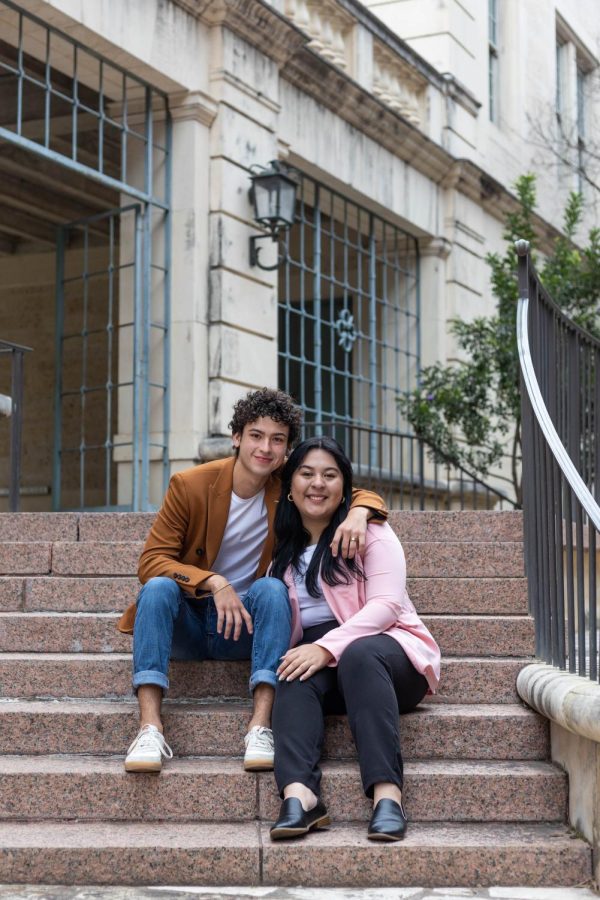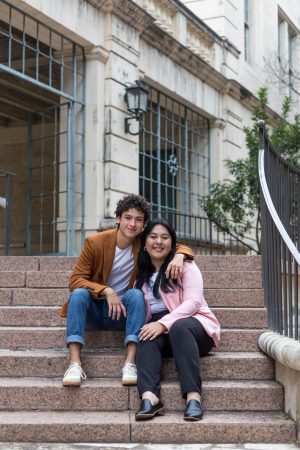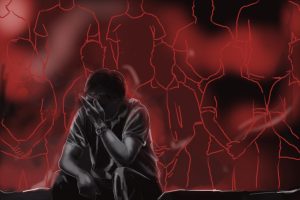Vote George and Ana for best chance at feasible change
February 24, 2023
Editor’s note: This endorsement reflects the opinion of the Daily Texan Editorial Board and not necessarily the opinions of The Daily Texan staff as a whole.
From getting little done to a lack of transparency and accountability, many students have lost interest in the proceedings of the UT Student Government. However, every year, the student body elects a new president and vice president in the hopes that they’ll usher in productive change. This year’s current administration under Leland Murphy and Isabel Agbassi has helped move SG in the right direction, and we hope that whoever follows them will continue this trend.
As the Texan’s Editorial Board, we are responsible for endorsing one executive alliance, and we made our decision based on which duo we believe is most prepared to enact feasible change. To this end, we assessed this year’s executive alliance candidates and their campaigns based on three main considerations.
First, we conducted hour-long interviews with each alliance. We then reviewed the questionnaire, policy chart, candidate column and platform materials that each alliance submitted to the board. Finally, we considered how each alliance performed in the SG debate.
This year, four executive alliances campaigned: Diego Collazo with Brian Pena, George Boghs with Ana Fuentes, Harsh Kumar with Marlene Weis, and Helen Getachew with William Ramirez.
After considering the alliances and their campaigns, we recommend that you vote for George and Ana. We want to be clear; we were not broadly impressed with any alliance this year. However, because George and Ana understood and tailored their policies to the limitations of SG, we believe they are best equipped to execute their goals.
Harsh & Marlene
Harsh and Marlene say that differing perspectives are important to cultivate productive conversations, but their contrasting views put them on entirely different pages for their campaign. With conflicting answers, a lack of cohesion and their penchant for interrupting each other, Harsh and Marlene certainly seem divided. Frankly, we’re not sure why they’re running together. Their work-study program is an interesting idea, but it seems to be the only platform point they’ve given much thought to. When asked how they planned to execute their other goals, Harsh and Marlene could not provide clear, actionable plans. They were explicit in their understanding that student organizations spark much of the change on campus, but seemed more inclined to offload their own responsibilities onto others than provide genuine leadership. Ultimately, their platform is filled with buzzwords — opportunity, accountability, transparency, accessibility — but we are not confident in their ability to achieve any of these things.
Helen & William
Helen and William have constructed a well-intentioned platform, with admirable goals and a clear focus on diversity, equity and inclusion initiatives. They seem genuine in their desire to improve campus and support students from marginalized communities. Unfortunately, we believe that in developing their nine campaign goals, Helen and William underestimated the time and cost necessary to achieve them. For instance, they seek to establish “The State of Students Summit” as a way to repair the relationship between SG and student organizations, particularly identity-based ones. While they are correct in their understanding that regaining student trust is challenging and noted the cost of getting IRB approval for their T3S survey, they failed to acknowledge the significant barrier of administrative pushback and considerable costs associated with a project of this scope. In addition, Helen and William fell short during both the debate and interview. We were not able to get a clear understanding of their specific goals from speaking with them, though the policy materials provided to us laid out their plans in commendable detail. Furthermore, the broad, ambitious nature of their nine policies makes them unfeasible for a yearlong tenure and demonstrates a lack of understanding of SG’s limitations. For these reasons, we do not believe they are prepared to serve the student body as SG president and vice president. However, we commend the work Helen and William have already done to improve campus and believe they are well-equipped to continue doing so.
Diego & Brian
Diego and Brian bring on-campus experience and a well-organized campaign to the table. They came prepared, and of all the alliances, they seemed to have the most political knowledge. While this is often a strength, we found that their reliance on it manifested as a weakness in their campaign platform. For starters, when asked how they planned to work with UT administration, Diego and Brian expressed a desire to take a more aggressive approach while relying on local politicians and media to help support their goals. While their frustration with administrators is understandable, being able to work and compromise with them is necessary for getting anything done in SG. Furthermore, their on-campus goals seemed poorly thought out. Their first academic policy is the Printing Pass, intended to create a currency system used for printing. Per their campaign materials, they believe the policy “can be swiftly passed and easily implemented, because the infrastructure to support it already exists.” However, they fail to justify their belief by pointing out what that infrastructure involves, and they underestimate the administrative challenges and monetary costs of executing that goal. With these considerations, we are unable to endorse Diego and Brian. Still, they’ve enacted positive change for students, and we appreciate the energy and effort they’ve brought to their campaign.
Our endorsement: George & Ana
George and Ana’s campaign was built for this campus and its students. SG has power and resources, but its efforts are hindered by bureaucratic red tape, cost of implementation and a history of inaction and harm that have resulted in a lack of trust from the student body. This means SG is often slow to enact change and limited in the scope of what it can do; any effective executive alliance must have this in mind when developing their policies. We felt that George and Ana were the only alliance to successfully do so. In particular, the mental health pillar of their campaign advocates for feasible resource expansion and models a pre-existing system in place at UT San Antonio. We believe that their seven policies, addressing issues ranging from professional development to reproductive justice, will foster productive change and benefit students across this campus. While their presence at the debate was underwhelming, we were impressed by their rapport as well as the research, clarity and enthusiasm they showed during their interview. George and Ana are unlikely to achieve everything they want, but of all the alliances on this ballot, they are most prepared to execute their goals.
We want to acknowledge that running for SG president and vice president is an extremely arduous and time-consuming task. It’s not easy to put yourself on a public platform and accept criticism, and we appreciate that this year, there are candidates who clearly want to bring positive change to UT. We believe that these small steps towards progress start with George and Ana.
Join us in voting for them in the campus-wide elections from Monday, Feb. 27 at midnight to Tuesday, Feb. 28 at 5 p.m.
This editorial was written by associate editors Justice DuBois, Faith DuFresne, Alyssa Ramos and editor-in-chief Megan Tran.

















